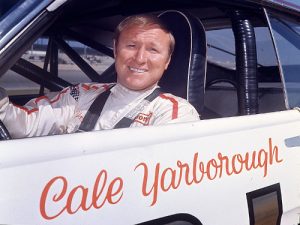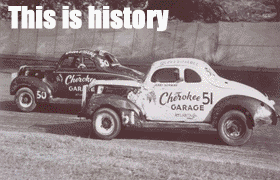
NASCAR Hall of Famer Cale Yarborough won six NASCAR Cup Series races in 1968 driving for the famed Wood Brothers, including the inaugural Cup Series event held at the Jefco Speedway (later Gresham Motorsports Park) in Jefferson, Georgia. Photo: ISC Images & Archives via Getty Images
NASCAR Hall of Famer Cale Yarborough passed away on Sunday morning at the age of 84.
The Timmonsville, South Carolina native was a “racer’s racer”, a fierce, tenacious driver behind the wheel while serving as a friendly ambassador to the sport to the fans. He would score 83 wins on the NASCAR Cup Series circuit, including four Daytona 500 victories and five Southern 500 wins. He was the first driver in history to win three consecutive NCS championships in 1976, 1977, and 1978.
“Cale Yarborough was one of the toughest competitors NASCAR has ever seen, said NASCAR Chairman and CEO Jim France. “His combination of talent, grit and determination separated Cale from his peers, both on the track and in the record book. He was respected and admired by competitors and fans alike and was as comfortable behind the wheel of a tractor as he was behind the wheel of a stock car. On behalf of the France family and NASCAR, I offer my deepest condolences to the family and friends of Cale Yarborough.”
Born on March 27, 1939, Yarborough was a high school football standout, and attended his first race as a fan at the famed Darlington Raceway in 1951. Yarborough raced sporadically on the circuit from 1957 through 1962, finally earning a part-time ride with former driver Herman Beam. While driving Beam’s No. 19 Ford, Yarborough recorded three top five and seven top 10 finishes in 14 starts.
Two years later, Yarborough scored his first career NASCAR victory on June 27, 1965 at Valdosta 75 Speedway, Valdosta, Georgia, where he topped the field by three laps.
That same year, Yarborough earned his first piece of national notoriety. While racing for the lead in the Southern 500 at Darlington against Georgia Racing Hall of Famer Sam McQuagg, the two tangled on lap 118, sending McQuagg’s car spinning and Yarborough’s Ford sailing over the guardrail. Yarborough’s mount flipped several times before coming to rest in a parking lot. Afterwards, Yarborough joked that he had to buy a ticket to get back inside the track.
Highlights of the race were shown weeks later on ABC’s “Wide World of Sports” program, and the incident would be shown as a part of the television program’s opening credits for several years.
Yarborough’s big break came in 1967, when he was tapped to drive the famed No. 21 Ford for the Wood Brothers. The pairing landed Yarborough in victory lane just five races in, as he won from the pole at Atlanta Motor Speedway on April 2. He followed that with a major victory in the July 4 race at Daytona International Speedway.
But 1968 was Yarborough’s breakthrough year, as he and the Wood Brothers recorded six victories on the season, starting with a come-from-behind win in a duel with fellow Ford driver LeeRoy Yarbrough. Yarborough lost a lap early due to an ignition problem, then made up ground on the leaders. After making several attempts over the closing laps, Yarborough made the final pass for the lead on Yarbrough with three laps remaining, and went on to claim his first Daytona 500 victory.
Yarborough also scores his first Southern 500 win in a thrilling late-race duel with fellow South Carolina native David Pearson. Yarborough closed out the year by winning the season finale in the first ever NASCAR Cup Series race held at Jefco Speedway (now Gresham Motorsports Park) in Jefferson, Georgia on November 3, 1968.
The next big shift for Yarborough’s career came in 1973, when he paired up with legendary driver turned car owner Junior Johnson. Over the next eight years, Yarborough and Johnson recorded 46 victories, including the 1977 Daytona 500, the 1974 and 1978 Southern 500, and three national championships.
During his tenure with Johnson, Yarborough played a role in NASCAR’s much ballyhooed breakthrough race at Daytona in 1979. It was the first time the Daytona 500 was carried live, flag-to-flag, on national television, and as the race wound down, it became a two-car battle between Yarborough and Donnie Allison. With half a lap to go, the two tangled on the backstretch, and crashed in turn three. That allowed Richard Petty to sneak past and score the win.
Meanwhile, Yarborough, incensed by the crash, got into a fight with both Donnie Allison and his brother Bobby Allison, as an audience of millions watched line on CBS.
In 1981, Yarborough made the decision to slow his career down, moving to M.C. Anderson’s team to run a limited schedule. Yarborough continued his winning ways, parking the No. 27 Buick in victory lane five times over the next two years, including wins in the July Daytona race and the Southern 500 at Darlington in 1982.
The next season would see Yarborough make another career move – one that cemented him as a racing hero for millions of fans.
For the 1983 season, he moved to Harry Ranier’s No. 28 Hardee’s Chevrolet. In his first lap of qualifying for the Daytona 500, Yarborough became the first driver to break 200 mph in qualifying, turning a lap at 200.503 mph. However, on his second lap, Yarborough’s car spun in turn three, going airborne and flipping over in turn four. He was uninjured, but the car was demolished.
The team pushed a show car, a year old Pontiac LeMans into service for the 500. Yarborough drove the car to the front, and bypassed Buddy Baker with half a lap to go to score his third Daytona 500 victory.
The win came with a CBS Sports camera on board his No. 28, carrying the fans at home to victory lane with him.
One year later, Yarborough repeated the feat, passing Darrell Waltrip on the late lap to score his fourth Daytona 500 win, becoming just the second driver in history to accomplish the feat, along with Richard Petty, who won back-to-back 500s in 1973 and 1974.
Once again, Yarborough won “The Great American Race” with a CBS camera onboard. The fan reaction was so great that he would go on to make appearances as himself in two episodes of “The Dukes of Hazzard,” with one using the onboard footage as a part of the storyline.
Yarborough would win the final four races of his career driving for Ranier, with last of those coming at Charlotte Motor Speedway on October 6, 1985. He would depart the team in 1987 to start his own team, and would retire from driving at the end of the 1988 season.
One aspect of his career that is often overlooked came in 1971, when he became the first modern NASCAR star to take a serious crack at IndyCar racing. Driving for Georgia Racing Hall of Famer Gene White, Yarborough made several starts in 1971, with his best results being a pair of top 5 finishes at New Jersey’s Trenton Speedway in 1971 and at Michigan Speedway.
In all, Yarborough made four starts in the famed Indianapolis 500 between 1966 and 1972. His best finish in “The Greatest Spectacle In Racing” came in his final start as a driver at the famed Brickyard with a 10th place result in 1972.
“Cale Yarborough was not just a NASCAR champion and Daytona 500 winner, he was one of the most versatile race car drivers our sport has seen,” said Indianapolis Motor Speedway President J. Douglas Boles. “He qualified for four Indianapolis 500s during one of the race’s most competitive eras and competed in a season of IndyCar Series racing – scoring two top-five finishes – in 1971 during the height of his driving career. The fans and drivers at IMS loved his competitive spirit, passion, and understanding and appreciation of what racing at Indianapolis means, whether as a driver or team owner. Our sport and our event have lost an icon.”
Yarborough’s fortunes as a car owner were not a rich as they were as a driver. Despite employing drivers such as Dale Jarrett, John Andretti, Dick Trickle Derrike Cope, Rich Bickle, Jeremy Mayfield, and Rick Mast, his team only found Victory Lane in a points paying event once. That came with Andretti behind the wheel in the July Daytona race in 1997.
Yarborough sold his team in 2000, and largely stayed out of the racing limelight from there on. He was inducted into the NASCAR Hall of Fame in 2012, and made a surprise appearance in the NASCAR Cup Series banquet in 2008 to honor Jimmie Johnson, who had just become the only other driver to win three consecutive titles.
Yarborough dedicated himself to his farm and his family after leaving racing, but while he didn’t do a lot of appearances, he still remained accessible for the racing fans and community.





















Leave a Reply
You must be logged in to post a comment.